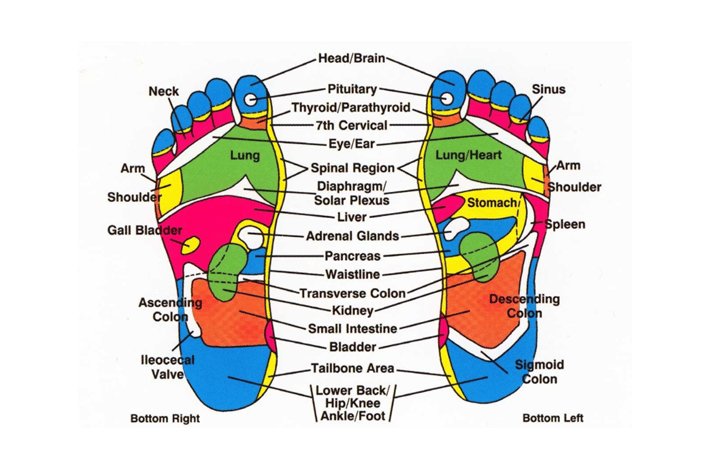The Power of Foot Reflexology
Learn about the amazing benefits of foot reflexology and how it can improve your overall well-being.
Reflexology, an ancient therapeutic practice, has been embraced by cultures worldwide for centuries and is currently employed as a complementary therapy to alleviate a variety of symptoms and health issues. This method involves applying specialized techniques to specific points on the foot, which correspond to various areas of the body. The application of pressure to these points is intended to yield diverse health benefits, including relief from pain, sleep disturbances, depression, and anxiety. Reflexology is distinct from massage, focusing on the stimulation of reflex points in the feet, hands, or ears, believed to be connected to other bodily organs and systems through energy pathways. It is often utilized in conjunction with conventional medical treatments as a complementary approach.




1. Potential Pain Relief
Reflexology has shown promise in relieving pain, according to research. A study involving 311 patients with chronic musculoskeletal or nerve pain indicated that a single session of foot reflexology led to a perceived reduction in pain for 94 percent of participants. Additional studies also suggest its effectiveness in post-operative pain and premenstrual syndrome. However, more research is needed to establish reflexology's role in addressing specific conditions like chronic low back pain and migraines.
2. Potential Mental Health Benefits
Reflexology is believed to induce relaxation, potentially offering mental health benefits. A meta-analysis of 26 trials revealed significant improvements in adult depression, anxiety, and sleep quality. Reflexology has also demonstrated positive effects on anxiety in patients undergoing coronary artery bypass graft surgery and in women with multiple sclerosis. While supportive evidence exists, longer-term studies are recommended to solidify its role as a complementary therapy for mental health concerns.
3. Potential Sleep Improvement
Reflexology may offer support for individuals experiencing sleep troubles, as suggested by a review of 42 studies. Significant improvements in sleep quality were observed, with fewer reported disturbances. Additionally, a study involving menopausal women found that 15 minutes of daily reflexology for three weeks improved sleep quality compared to a control group.
4. Potential Relief in Cancer and Cancer Treatment Symptoms
Complementary therapy with reflexology may help alleviate the physical and mental toll of cancer and its treatments. In a study involving breast cancer patients undergoing chemotherapy, those receiving reflexology reported significantly less fatigue. A review of cancer pain management studies also found a generally positive effect for reflexology, though the quality of the included studies varied.
5. Potential for Digestive Issue Relief
While the National Center for Complementary and Integrative Health is cautious about reflexology's effectiveness for irritable bowel syndrome (IBS), some research suggests benefits for certain digestive symptoms, particularly constipation. A study on chronic constipation patients and a review/meta-analysis both indicated potential effectiveness of foot reflexology as a complementary therapy.
In conclusion, reflexology, a practice with a rich historical background, is employed today as a complementary therapy with potential benefits for pain relief, mental health, sleep improvement, cancer symptom alleviation, and digestive issue relief. While generally considered safe, consulting with a medical professional is advised for those considering reflexology to support overall health and wellness.
